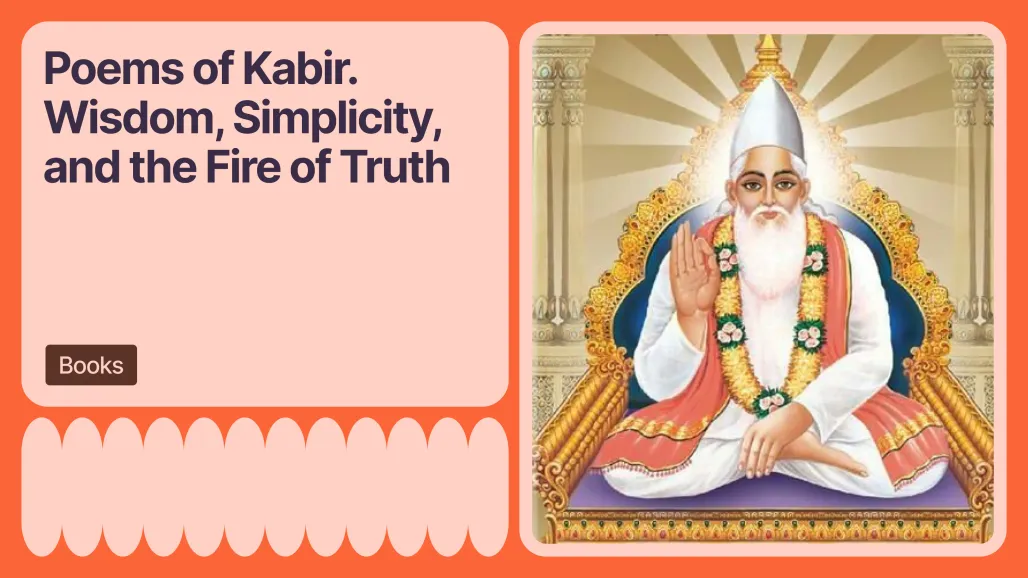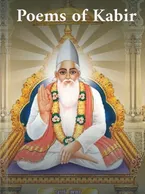Poems of Kabir. Wisdom, Simplicity, and the Fire of Truth

A bold, timeless guide to truth, Songs of Kabir challenges ego, rituals, and shows the divine is already within you.
Who Was Kabir?
What Are These Poems Really About?
Spiritual Truth Over Ritual
The Divine Within
The Illusion of Ego
Simplicity and Everyday Life
Urgency and Inner Action
Why Kabir Still Matters
Read It on WholeReader
If you're looking for poetry that’s ancient yet feels surprisingly fresh — spiritual but also deeply human — Poems of Kabir might just be your next favorite read. This short but powerful collection is packed with sharp insights, soul-stirring questions, and a whole lot of wisdom that still makes sense in today’s busy, confused world.
Let’s dive into who Kabir was, what these poems are all about, and why they matter.
Who Was Kabir?
Kabir (circa 1440–1518) was a 15th-century Indian mystic poet and saint. Born in Varanasi (then known as Kashi), Kabir was raised by a Muslim weaver family, but his spiritual outlook didn’t fit neatly into any religion.
Instead, he became a voice for unity, truth, and personal experience over blind ritual. His poetry blends ideas from Hinduism, Islam, and Sufism — but challenges all of them when they lose their heart.
He became one of the most quoted and sung poets in Indian history, and his verses still appear in Sikh scriptures and devotional music today.
surf: where is the difference between the river and its waves?
When the wave rises, it is the water; and when it falls, it is the same water again. Tell me, Sir, where is the distinction?
Because it has been named as wave, shall it no longer be considered as water?

Kabir's approach was direct. He used everyday language and bold metaphors to speak to ordinary people — farmers, weavers, shopkeepers — not scholars. But his words cut deep.
What Are These Poems Really About?
Poems of Kabir is a collection of short, powerful verses that challenge the reader to look inward, strip away ego, and find the divine in the everyday. Written over 500 years ago and translated into English by Rabindranath Tagore, these poems still feel urgent, alive, and incredibly human.
While Kabir’s poems are short, they tackle some big ideas. Let’s look at the major themes he explores — and how his words bring them to life.
Spiritual Truth Over Ritual
Kabir didn’t trust rituals, ceremonies, or people who “looked” religious. To him, true spirituality had nothing to do with outward appearances. What mattered was the inner connection — honest, personal, and beyond any tradition.
Then I left off all rites and ceremonies, I bathed no more in the holy water:
Then I learned that it was I alone who was mad, and the whole world beside me was sane; and I had disturbed these wise people.

For Kabir, spiritual growth wasn’t about doing the right rituals — it was about seeing clearly, living truthfully, and letting go of performance.
The Divine Within
Kabir didn’t see God as some faraway being up in the sky. He believed the divine was within — inside every person. You didn’t need to go anywhere to find it. Just look inside.
Lo! I am beside thee.
I am neither in temple nor in mosque:

This is one of the most important ideas in Kabir’s work: you already carry the sacred within you. It’s not about finding God; it’s about realizing what’s already there.
He constantly reminds readers to stop looking outside and turn inward.
The Illusion of Ego
Ego — the constant voice of “I, me, mine” — was, for Kabir, the biggest obstacle to spiritual clarity. His poems challenge the reader to let go of pride, self-importance, and the illusion of control.
O Friend! go not there;
In your body is the garden of flowers.
Take your seat on the thousand petals of the lotus, and there gaze on the Infinite Beauty.

We don’t need to go anywhere to find peace or beauty. It's already here — but ego distracts us from seeing it.
Simplicity and Everyday Life
Kabir wasn’t a monk in a monastery — he was a weaver. His poems reflect the world he lived in: rivers, threads, mirrors, pots, dust. He didn’t use big philosophical terms; instead, he used simple images anyone could understand.
Kabîr says: “I am weaving the garland of day and night. When my Lover comes and touches me with His feet, I shall offer Him my tears.”

The divine, for Kabir, is not some abstract idea. It’s woven into the fabric of life. You can find truth in your work, in your breath, even in the silence between words.
Urgency and Inner Action
One of the strongest threads in Kabir’s poetry is urgency. He constantly tells us: life is short. Don’t waste it. Don’t wait for some perfect moment to start your spiritual path. That moment is now.
Put thy cleverness away: mere words shall never unite thee to Him.

He’s not saying this to scare us — but to shake us out of sleepwalking. His poems are a wake-up call to live more honestly, more fully, more awake.
Why Kabir Still Matters
Kabir’s work has influenced saints, reformers, musicians, and poets for centuries. He’s been claimed by Hindus, Muslims, Sikhs, and secular thinkers alike. But his real power lies in how personal his poems feel.
He wasn’t trying to build a religion. He was trying to tell the truth — even when it made people uncomfortable.
In today’s world of noise, distraction, and division, Kabir’s voice stands out. He reminds us to simplify, to listen deeply, and to stop pretending.
Read It on WholeReader
If you’re tired of shallow inspiration or endless preaching, Kabir is refreshing. His poems are short enough to read in minutes — but they’ll stay with you for days. They don’t offer easy comfort, but they do offer clarity. And even if you don’t consider yourself “spiritual,” these verses will challenge how you think — about yourself, your ego, your habits, and what really matters.

Want to hear these poems as you read them? Try Poems of Kabir on WholeReader, where you can read along with aligned narration. It’s a powerful way to feel the rhythm and flow of Kabir’s words — especially if you're new to poetry.
Poems of Kabir is more than just a book of verses — it’s a conversation across centuries, asking: What matters? What’s real? And what’s holding you back?
Read it slowly. Read it honestly. And be ready to look within.
